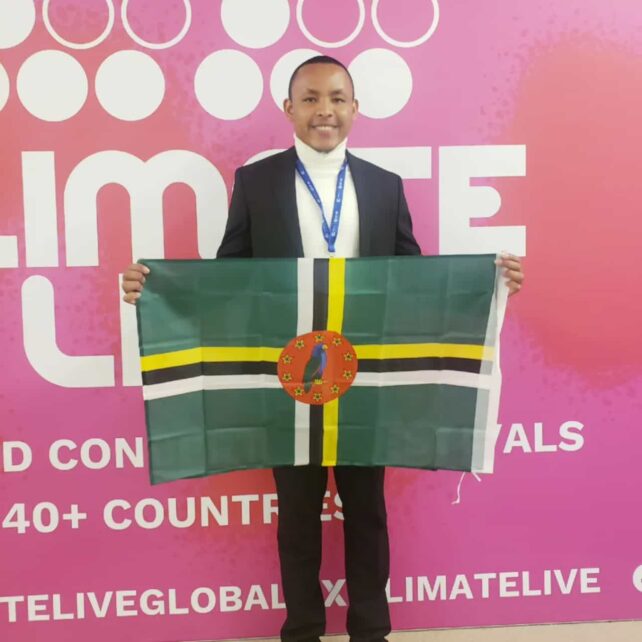Ferdison Valmond appeals for greater inclusivity of Indigenous youth and protection of Indigenous lands at COP28
The following article is republished from Dominica News Online and was written on December 5, 2023.
In the heart of COP28 in Dubai, 20-year-old climate and youth activist Ferdison Valmond is amplifying a crucial message – the pressing need for greater inclusiveness of Indigenous youth and the protection of Indigenous lands. As one of the 100 young delegates shaping the global debate, Valmond, along with a team of eco ambassadors, is ensuring that the voices of the youth are not only heard but actively contribute to the discussions on protecting the planet for future generations.
During his address at the High-Level Meeting of Heads of State globally on December 2, the Kalinago youth underscored the significance of young people’s involvement in these spaces, asserting that the younger generation is not merely the future but also the architects of the present.
“We are the experts in today’s world, the change makers, the architects of our lives and the future, and we must be included in spaces that will determine our future because we are not only the future, but the present and this must be maintained at all times,” he passionately declared.
In his fervent plea, Valmond underscores the role of youth as future custodians of the planet, expressing a deep commitment to environmental stewardship and the preservation of the natural world for generations to come.
“We are here to demand that our voices be heard and our perspectives be included in the decision-making processes that will shape the future of our planet.”
However, he pointed out the historical marginalisation of Indigenous youth in critical discussions about environmental policy and climate action. Valmond highlighted the invaluable traditional knowledge held by Indigenous communities, emphasising that their voices bring unique insights into sustainable living and harmonious coexistence with nature.
Despite this wealth of wisdom, he stressed that indigenous voices are often sidelined in favour of top-down approaches that fail to consider their distinct challenges and perspectives. Recognizing the urgency of the climate crisis, the Sineku native accented the need for inclusive and equitable solutions that respect the rights and wisdom of Indigenous peoples.
“We call upon heads of government and all decision-makers to recognize the vital role that Indigenous youth can play in shaping environmental policy and driving positive change in our communities,” he stated.
“We urge you to engage with Indigenous youth in a meaningful and respectful manner, valuing our contributions and seeking our input on matters that directly affect our lives and our futures. We are not simply token representatives to be paraded for photo opportunities; we are active participants with a deep-seated commitment to our communities and the preservation of our natural world,” Valmond added.
Moreover, he advocated for the prioritisation of the protection of Indigenous lands and territories, viewing them as essential bastions of biodiversity and ecological resilience. By granting Indigenous communities greater control and autonomy over their ancestral lands, he argued that global leaders can safeguard vital ecosystems and mitigate the
destructive impacts of industrial development and resource extraction.
In tandem with the call for protection, Valmond underscored the necessity of increased support for Indigenous-led initiatives promoting environmental sustainability and climate resilience. As stated, “Too often, Indigenous communities are left to fend for themselves in the face of environmental crises, lacking access to the resources and support they need to adapt and thrive in a rapidly changing world. By investing in Indigenous youth and their communities, you can empower us to become leaders in the fight against climate change and environmental degradation.”
He further called for greater recognition of the disproportionate impact of environmental injustices on Indigenous peoples who often bear the brunt of ecological harm and exploitation.
“From toxic pollution to the encroachment of industrial projects, Indigenous communities face numerous threats to their health, well-being, and way of life,” he noted. “ It is essential that any climate action and environmental policy address these injustices and work to rectify the historical and ongoing harms inflicted upon Indigenous peoples.”
In conclusion, he implored global leaders to pledge their commitment to upholding the principles of free, prior, and informed consent, respecting the rights of Indigenous peoples to autonomously determine their futures and participate in decisions that directly affect their lives.
Vamond stressed, “Too often, Indigenous communities are sidelined and ignored when it comes to major development projects and environmental policies that impact their territories. By honouring the right to consent, you can ensure that Indigenous youth have a seat at the table and a say in the decisions that will shape the world we inherit.”
In closing, he asserted the youths’ readiness to collaborate with the policymakers in a spirit of mutual respect. Armed with a wealth of knowledge, wisdom, and an unwavering passion for our planet’s protection, Valmond urged them to heed the young voices and integrate their perspectives into the deliberations and decisions that will mould the future of our world.
During a previous interview with Dominica News Online (DNO) the climate activist revealed that in addition to shedding light on the challenges that Dominica and other Small Island Developing States (SIDS) face due to climate change at COP28, he also aims to foster collaboration between Indigenous groups, sharing knowledge and techniques to collectively address the climate crisis. An equally crucial aspect of his mission involves advocating for streamlined access to climate resilience project funding for SIDS like Dominica.
Valmond eagerly anticipates that policymakers will facilitate substantive participation at decision-making levels, inviting young voices to contribute their insights on climate change solutions. Drawing from the words of United Nations Secretary-General António Guterres, he underlined the pivotal role that young people play in the battle against the climate crisis.
Beyond the horizon of COP28, and his advocacy for youth involvement in decision-making processes at all levels, his dedication extends to championing cultural preservation and leveraging the wisdom of Indigenous communities to make significant strides in the global fight against climate change

